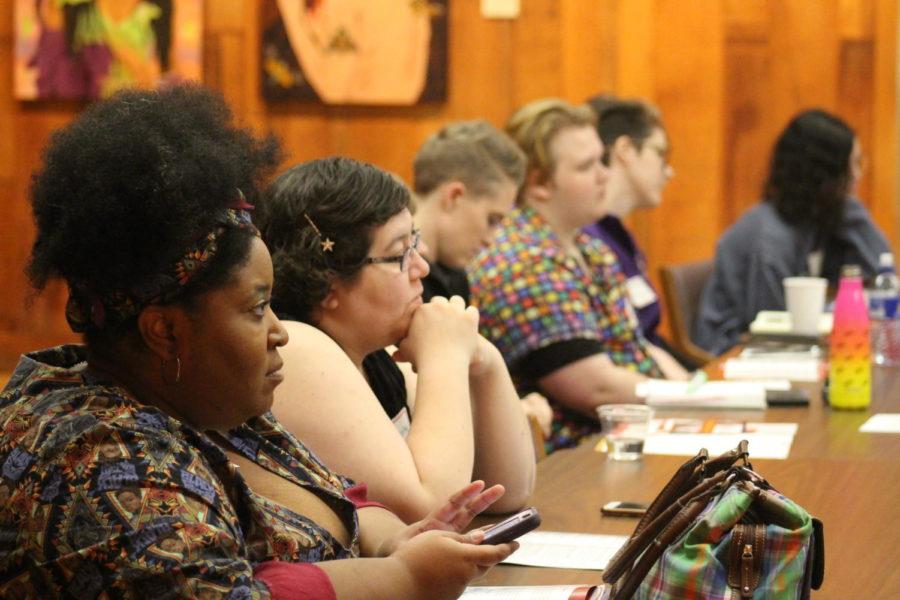Gender equality in relation to maternal mortality rate and issues facicing queer families spoken about in “family and reproductive rights” session
Women’s and Gender Studies Conference
April 7, 2019
The “Family and Reproductive Rights” session presented research surrounding gender development, sexuality and child care.
Itm Halimatusa’diyah presented “Gender Development, Women’s Political Voice and Maternal Mortality Disparities in Decentralized Indonesia.” Halimatusa’diyah gave a background on her research of maternal mortality, gender equality and decentralization.
The two research questions of the study were focused on how gender equality affects the maternal mortality rate. Halimatusa’diyah stated the maternal mortality rates in different areas of Indonesia and the amount of women representation in local legislates of 2014.
Halimatusa’diyah went through the data she looked at throughout her study. The findings showed that the higher gender development was the lower the maternal mortality rate was. The conclusion was that socioeconomic equality does matter and the political roles of women need to improve.
Danny Cook, Chelsea Davis, Roslyn Gray and Lexi Konfrst presented their study “Barriers to Child Care Among Iowa State University Student Parents.”
There are several obstacles that prevent student parents from receiving the child care they need. This group researched what the obstacles are and why they exist.
Cook began with talking about some of the obstacles. Child care is expensive and the access to it is decreasing. Student parents are suffering due to the lack of accessible child care, especially those of marginalized identities.
Cook also talked about the lack of insight on Iowa State student parents. The only data about student parents at Iowa State is from the Campus Climate Survey; the questions about child care are miniscule.
Konfrst listed the resources that are available and expanded on the limitations of access to child care.
Davis explained the survey they created and used for the study. The survey asked about specific experiences and also found some respondents were willing to participate in a focus group which will add a human element to the study.
Gray went over the analysis of the study results. The majority of respondents were women and mostly caucasian. One of the questions asked if participants thought child care was adequate. Sixty-five percent of respondents said they feel it is adequate “never/seldom/sometimes.” The biggest barriers found were lack of availability and financial stress.
The study also found that 81 percent of respondents had to miss class or university obligations due to issues with child care. Gray went over some suggestions the respondents left such as advertising wheelchair or stroller access, as well as offering part-time care instead of only full-time.
Sophia Biasi read her research paper “Implications for Maternal Mortality in the U.S.” Biasi’s paper began with statistics on maternal mortality and focused on why the rate is so shockingly high in the U.S at about 14 for every 100,000 births.
Biasi found that the U.S. has a maternal mortality rate similar to some emerging countries which doesn’t match up to the medical advances available in the U.S. Biasi spoke on professional tennis player, Serena Williams, and her complications.
Williams went through an emergency caesarean section and suffered from a pulmonary embolism and hematoma. Biasi said Williams was dismissed by many male doctors when she expressed her concerns.
Biasi’s research also found that there isn’t much research on the maternal mortality rate of the U.S. Biasi said she believes it should be a more mainstream topic of public conversation to help reduce risks.
Tucker Haddock also read his research paper “A Queer Family is a Bad Family: An Analysis of the Relationship Between the Queer Individual and the Family as Constructed by the Law.” Haddock’s research focused on queer individuals not being included in the idea of a nuclear family; a family consisting of two parents and their children.
Haddock found that the legal system imposed many things that prevented the idea queer people can have healthy families. Haddock spoke about one point of time when it was required for individuals to have sex reassignment surgery before they could legally change their gender. Having sex reassignment surgery makes the individual sterile therefore unable to have biological children.
There was a court case included in Haddock’s research paper where an individual transitioned from male to female. The individual’s ex-wife went to the court and claimed they weren’t fit to be a parent as they were a bad role model. The court system said the individual terminated their own parental rights by transitioning.
The legal system holding these beliefs means they have a biased perspective. Their perspective interferes with queer individuals having quality and having families.
















